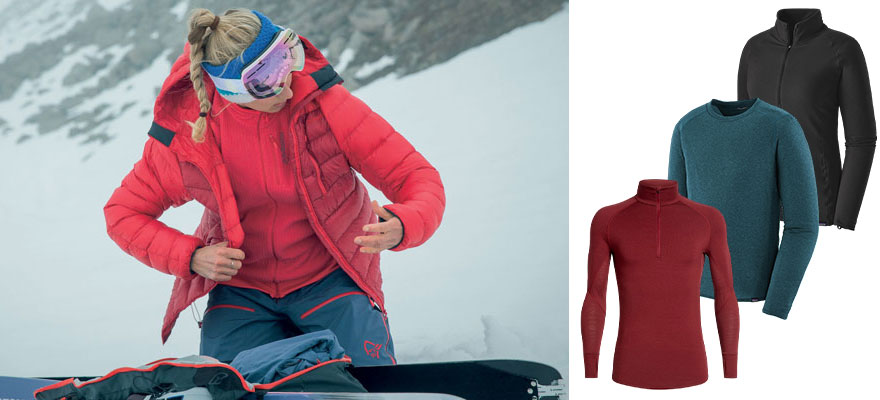The warmth/weight ratio is the amount of warmth or energy provided by material compared to its weight. The ratio of warmth to weight in the context of Merino highlights its capacity to provide efficient insulation without adding bulk or extra weight to clothes. It's the measure of how well the wool wicks away and stores body heat based on its thickness or density.
Merino wool is renowned for its exceptional warm-to-weight ratio. This means it can provide you with an enormous amount of thermal comfort and insulation and not feel too heavy. The warmth-to-weight ratio of Merino is a key factor in its natural insulation properties.
Merino fibres possess a natural waving or crimp that creates tiny air pockets within the fabric. These air pockets trap warm, humid air and create an insulating fabric that keeps warmth close to the skin.
Merino wool, though an excellent insulator it is comparatively light and thin compared to other materials. This is great for activities like outdoor sports, skiing or other activities where flexibility is key.
High Loft- Merino Wool fibers have a high loft, which means they can hold large quantities of air in relation to their dimensions. The gas that is trapped acts as an insulation layer, increasing the material's ability to resist cold.
Merino Wool is Breathable and Moisture Wicking. This allows sweat and excess moisture to evaporate from the skin, thus preventing dampness which can cause discomfort.
Temperature Regulation Merino's wool insulation doesn't just provide warmth, but it also assists to keep a temperature comfortable. It is able to regulate temperature by letting excess heat escape during warmer temperatures, and then retaining it when it gets colder.
Merino's high warmth to weight ratio makes it an ideal base layer for cold weather clothing. It provides an insulating, comfortable layer that doesn't add weight.
Merino is known for its warmth to weight ratio, making it the ideal choice for outdoor enthusiasts and athletes who require natural insulation. It's a light, warm material that allows you to enjoy your favorite activities without feeling like you're wearing too many layers. Take a look at the best spyder baselayer pants, skiing base layers for more examples including merino ski base layer, compression ski base layer, best layers for backcountry skiing, long underwear for skiing, womens silk ski underwear, childrens ski thermals, sweaty betty base layer ski, designer ski thermals, layering up for skiing, red ski base layer, and more.

How Can A Blend Of Yak And Merino Offer Warmth And Temperature Regulation To Prevent Overheating In Skiing Base Layers?
Merino, yarn and other fibers can be combined in skiing base layers to provide warmth and the ability to regulate temperature. This can help keep the body from overheating during skiing and other physical activities. Both fibers have distinct properties that create a microclimate on the skin that ensures comfort under any weather condition. The way this blend can provide you with effective insulation and help regulate your temperature.
Heat and Insulation
Merino hair and yak fur are both known as having insulation properties because of the air that is trapped within their fibers. The hollow structure of yak hair creates pockets filled with air which provide insulation.
Combining these fibers into an amalgam increases their insulation abilities, creating an effective barrier to cold and helping to maintain body heat.
Temperature Control
Merino is highly breathable, and it has excellent moisture-wicking properties. It helps remove excess heat and moisture off the skin. This prevents excessive heat during physical activity.
The hollow fibers of Yak fibers regulate temperature by allowing for the circulation of air inside each fiber. This circulation of air helps maintain a healthy microclimate close to the skin.
Moisture Management
Merino wool, as well as yak hair are both hydrophilic. They can absorb moisture and vapors from air and the skin. Evaporation releases this moisture out into the air.
The blend's moisture-wicking capabilities keep your skin dry by wicking sweat away from your face. Dry skin is less irritated, itching, and cooling due to the cooling effect of evaporative cool.
Balanced Peace and Comfort
Merino, yak, and other fibers are combined in a manner that produces a fabric offering warmth without keeping heat. This is vital for skiing and other active activities where body temperature is able to fluctuate.
The fibers' ability to regulate temperature prevents abrupt shifts in feeling hot or too cold, thereby enhancing general comfort.
Layering Benefits
Base layers crafted from this blend can be used in layering systems, allowing you to alter your clothes depending on your activity level and the weather. It is simple to add layers or subtract layers.
By combining the natural insulation, breathability, moisture management, and temperature-regulating properties of Merino wool and yak hair, this blend provides a versatile and comfortable option for skiing base layers. It keeps a healthy body temperature and helps prevent overheating. Have a look at the best base layer for skiing info for more tips including best wool thermal underwear, icebreaker wool base layer, merino ski wear, merino short sleeve base layer, dutch army merino wool base layer, norrona merino base layer, wool base layer clothing, merino baselayer rad, helly hansen lifa merino wool base layer, merino base layer top mens, and more.
[img]https://cdn.outsideonline.com/wp-content/uploads/2022/10/best-mens-baselayers-wgg-23_h-1024x576.jpg?width\u003d1200[/img]
